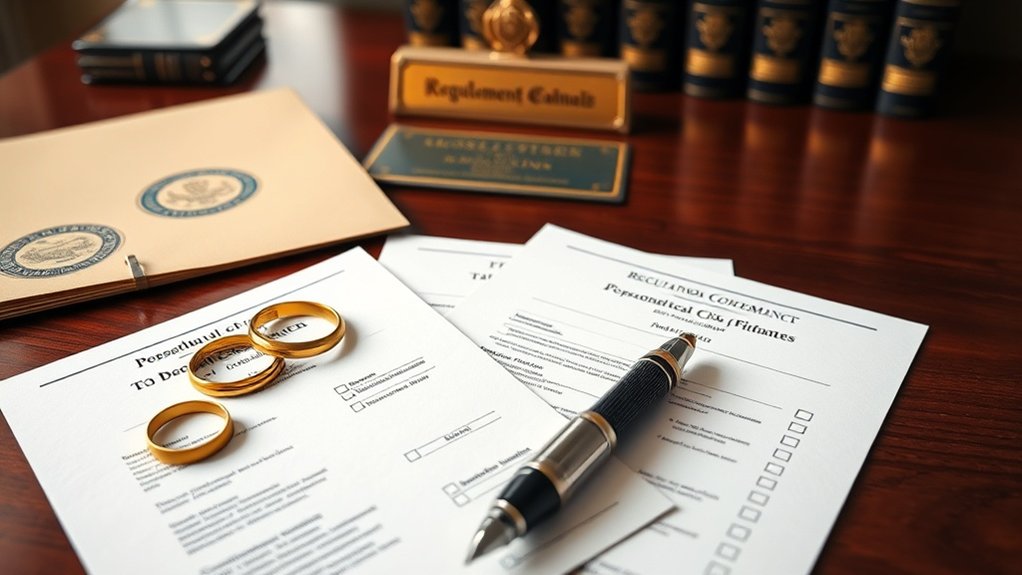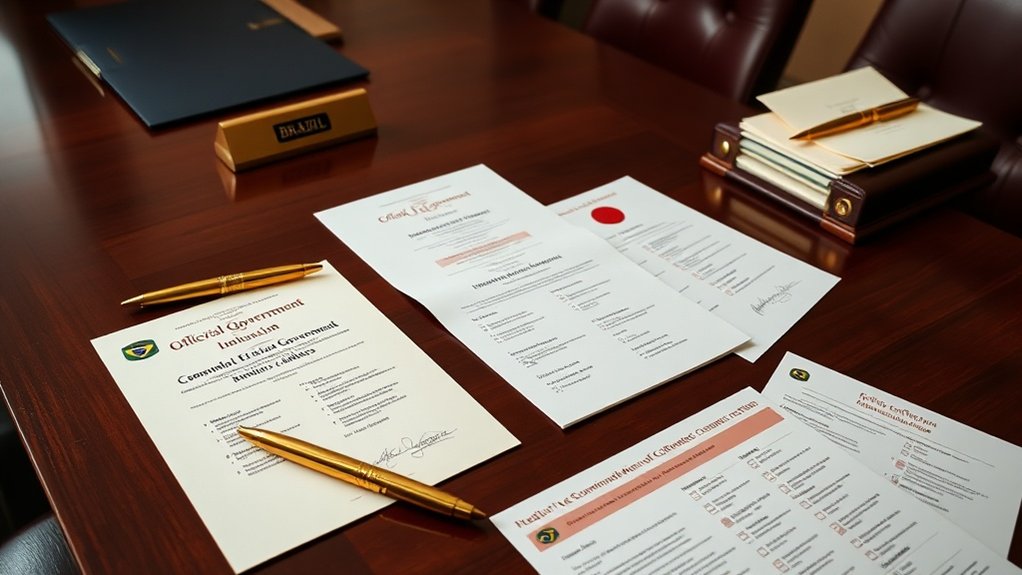You’ve probably experienced the frustration of outdated records causing delays with government agencies, but Brazilian law firms face even stricter consequences when their professional information isn’t current. When your firm’s address changes or an attorney’s marital status shifts, multiple authorities require immediate notification—and the penalties for late submissions can impact your practice’s standing with the OAB. The coordination process involves more complexity than most firms anticipate.
Understanding Regulatory Filing Requirements for Brazilian Law Firms

When you operate a Brazilian law firm, you’ll face complex regulatory filing requirements that demand strict compliance with federal and state authorities. You must register with the Ordem dos Advogados do Brasil (OAB), Brazil’s national bar association, which maintains strict oversight of legal practitioners and firms.
You’re required to report any changes to your firm’s registration data, including address modifications, partner updates, and organizational structure changes. These filings must be submitted within specific timeframes to avoid penalties or suspension of your practice license.
The OAB mandates that you maintain current information about your firm’s location, contact details, and key personnel. You’ll also need to comply with federal tax authority requirements, updating your CNPJ registration whenever material changes occur.
Additionally, you must file annual reports demonstrating compliance with professional standards and continuing education requirements. Failure to meet these obligations can result in fines, suspension, or revocation of your firm’s operating license.
Immigration law firms face additional complexity as they must ensure adherence to constantly changing immigration laws while helping clients navigate visa processes and residency applications.
Types of Personnel Information Updates Required by Government Authorities
Beyond basic firm registration changes, you must report specific personnel updates to multiple government authorities throughout your law firm’s operations. These mandatory filings ensure compliance with Brazilian regulatory frameworks and maintain your firm’s legal standing.
Attorney-specific updates form the core of personnel reporting requirements. You’ll need to document licensing changes, disciplinary actions, and professional certifications with the Order of Brazilian Lawyers (OAB). Additionally, tax authorities require notification of partner additions, departures, and ownership percentage modifications.
Key personnel information updates include:
- Marital status changes affecting tax liability, benefit eligibility, and legal representation capacity
- Address modifications for partners, associates, and key administrative staff members
- Professional qualification updates including new certifications, specializations, and educational credentials
Administrative staff changes also trigger reporting obligations, particularly for positions involving financial responsibilities or client data access. You must maintain accurate records and submit updates within prescribed timeframes to avoid penalties and ensure continued regulatory compliance.
Immigration attorneys must also update client documentation when changes in marital status or address affect ongoing visa applications or residency processes to prevent delays or potential denials.
The Process Behind Submitting Comprehensive Data Changes

Understanding what updates you need to submit sets the foundation for executing these changes effectively. The submission process requires careful preparation and attention to detail.
You’ll start by gathering all necessary documentation that supports your data changes. This includes official certificates, court orders, or government-issued documents that verify the updates you’re requesting. Each document must be current and properly authenticated.
Next, you’ll complete the appropriate forms for each government authority. Different agencies have specific requirements and formats, so you can’t use a one-size-fits-all approach. You’ll need to cross-reference each form against your supporting documents to ensure accuracy.
You’ll then submit your applications through the designated channels, whether online portals, physical offices, or registered mail. Many authorities require original documents or certified copies, so you’ll plan accordingly.
Finally, you’ll track your submissions and follow up as needed, maintaining records of all correspondence and confirmation numbers for future reference. Organized and updated documentation expedites the immigration process and reduces the likelihood of delays or complications with government authorities.
Coordination Challenges Across Multiple Government Agencies
Although you’ve meticulously prepared your documentation and submissions, you’ll quickly discover that government agencies don’t communicate with each other as seamlessly as you might expect. This disconnect creates significant coordination challenges when updating personal information across multiple departments.
Each agency operates with its own systems, timelines, and requirements. You’ll find yourself navigating bureaucratic silos where your address change at the tax office doesn’t automatically update your voter registration or social security records.
The coordination difficulties you’ll encounter include:
- Different processing speeds – Some agencies update records within days while others take weeks or months
- Inconsistent documentation requirements – Each department may request different forms or supporting evidence for identical changes
- Manual cross-referencing needs – You’ll need to track which agencies have processed your updates and follow up individually
These challenges require strategic planning and persistent follow-through to ensure comprehensive data consistency across all government databases. Without specialized legal support, you risk encountering delays, processing errors, or incomplete updates that could create complications for your legal status or access to essential services.
Legal Framework Governing Professional Record Maintenance

While government agencies present their own coordination hurdles, professional licensing boards and regulatory bodies operate under distinct legal frameworks that impose specific obligations for record maintenance. You’ll find that attorneys must comply with state bar regulations requiring current contact information, while accountants face similar mandates from their respective licensing boards. These frameworks aren’t suggestions—they’re legally binding requirements with enforcement mechanisms.
You’re responsible for understanding notification timeframes, which typically range from 10 to 30 days after changes occur. Professional regulations often specify acceptable methods for submitting updates, whether through online portals, written correspondence, or certified mail. You’ll discover that some jurisdictions require documentation supporting your changes, such as marriage certificates or lease agreements.
Non-compliance carries consequences including license suspension, fines, or disciplinary action. You must also consider that professional liability insurance policies may require current address information, creating additional compliance layers beyond basic licensing requirements. Immigration attorneys face particularly complex requirements when maintaining records with multiple authorities, as immigration laws frequently change and require specialized expertise to ensure proper compliance across all regulatory bodies.
Impact of Outdated Information on Client Services and Operations
When your professional records contain outdated information, client relationships suffer immediate and measurable consequences. You’ll face operational disruptions that directly affect service delivery and client satisfaction.
Outdated records create significant barriers to effective client communication and case management:
- Communication breakdowns – Incorrect addresses and contact details prevent timely delivery of legal documents, court notices, and critical case updates to clients
- Billing complications – Wrong addresses cause invoice delays, payment processing issues, and potential disputes over service charges and fees
- Compliance violations – Inaccurate records may breach professional standards and regulatory requirements, exposing your firm to disciplinary action
You’ll also encounter internal inefficiencies as staff waste time tracking down correct information, rescheduling missed appointments, and resolving client confusion. These problems compound over time, potentially damaging your firm’s reputation and client retention rates. Maintaining current records isn’t just administrative housekeeping—it’s essential for delivering professional legal services and protecting your practice’s credibility in the marketplace. In immigration cases specifically, outdated client information can lead to deportation when critical documentation updates fail to reach clients facing pending visa or residency issues.
Best Practices for Managing Administrative Personnel Changes

Since administrative personnel changes directly impact your firm’s record-keeping accuracy, you’ll need structured protocols to prevent information gaps and maintain operational continuity. Establish comprehensive handover procedures that require departing staff to document all pending matters, client communications, and administrative responsibilities. Create detailed checklists covering client files, regulatory deadlines, and ongoing correspondence to ensure nothing falls through the cracks.
Implement cross-training programs so multiple team members understand critical processes like address updates, marital status changes, and regulatory filings. You can’t afford to have single points of failure in your administrative systems. Maintain centralized documentation systems where all procedures are clearly outlined and accessible to incoming personnel.
Schedule overlap periods between departing and incoming staff whenever possible. This allows for direct knowledge transfer and real-time problem-solving. Designate experienced team members as mentors for new hires, ensuring they understand your firm’s specific protocols for data management and client service standards. Given that immigration laws are frequently changing, your administrative team must stay current with regulatory updates to ensure all client data modifications comply with the latest requirements.
Documentation Standards for Address and Status Modifications
Beyond establishing solid handover protocols, your firm must maintain rigorous documentation standards for every address and status modification you process. These standards protect your practice from compliance issues and ensure seamless client service during transitions.
Your documentation framework should capture every detail of modification requests while maintaining clear audit trails. When personnel changes occur, incoming staff can quickly understand pending cases and continue processing without delays.
Essential documentation requirements include:
- Timestamp records – Document when you receive modification requests, process them, and submit to authorities
- Supporting evidence – Maintain copies of official documents like marriage certificates, lease agreements, or corporate registration changes
- Authority correspondence – Keep records of all communications with regulatory bodies, including confirmation receipts and response letters
You’ll also need standardized forms that capture client information consistently. This approach eliminates confusion about required fields and ensures nothing gets overlooked during high-volume periods or staff transitions.
For immigration-related status updates, remember that clients must register changes with the Federal Police within specified timeframes to maintain compliance with Brazilian migration laws.
Compliance Timeline Requirements in Brazil’s Legal Sector

Understanding Brazil’s compliance timeline requirements becomes critical once you’ve established proper documentation standards, as regulatory authorities impose strict deadlines that can’t be negotiated or extended.
You’ll face varying timeframes depending on the type of update and jurisdiction. Federal requirements typically demand submissions within 30 days of changes, while state authorities often require 15-day notifications for address modifications.
| Authority Type | Update Category | Timeline |
|---|---|---|
| Federal Registry | Address Changes | 30 days |
| State Bar Association | Contact Updates | 15 days |
| Municipal Records | Office Location | 10 days |
| Tax Authorities | Business Address | 30 days |
| Professional Licensing | Personal Information | 20 days |
Missing these deadlines triggers automatic penalties ranging from administrative fines to temporary practice suspensions. You can’t rely on grace periods or appeals to extend compliance windows. Documentation must be submitted complete and accurate within the specified timeframe to maintain good standing with regulatory bodies.
Immigration-related updates carry additional complexity since deportation orders can result from failing to notify authorities of address changes within required timeframes.
Systematic Approaches to Avoiding Administrative Complications
Proactive planning prevents the administrative headaches that emerge when you’re scrambling to meet Brazil’s rigid compliance deadlines. You’ll need structured systems that anticipate changes before they become urgent matters requiring immediate attention.
Establishing clear documentation protocols ensures you’re prepared when personal or professional circumstances shift. You should maintain current records across all relevant authorities simultaneously rather than handling updates piecemeal.
Consider these systematic approaches for streamlined compliance:
- Centralized tracking systems – Maintain a master calendar with all filing deadlines and renewal dates across different agencies
- Standardized documentation packages – Prepare template folders containing required forms, certificates, and supporting materials for quick deployment
- Regular audit schedules – Conduct quarterly reviews of all registrations and licenses to identify potential discrepancies before they escalate
You’ll find that investing time in systematic preparation dramatically reduces the stress and costs associated with last-minute compliance efforts. Consistent maintenance prevents small oversights from becoming major administrative complications. Given the complexity of immigration legislation and frequent updates, even minor documentation errors can result in significant delays or rejections when filing status changes with Brazilian authorities.
Frequently Asked Questions
How Much Does It Cost to File Data Updates With Brazilian Authorities?
You’ll pay varying fees depending on the specific update and authority involved. Address changes with the Federal Revenue Service typically cost around R$7-15, while civil registry updates for marital status range from R$50-200. Professional license updates can cost R$100-500. Municipal registration changes vary by city but usually run R$20-100. You’ll also need to factor in notarization fees of approximately R$10-30 per document when required.
What Penalties Apply if Vieira Braga Fails to Update Information on Time?
You’ll face fines ranging from R$500 to R$50,000 depending on the authority and violation type. The OAB can impose disciplinary sanctions including warnings, censure, or temporary practice suspension. Tax authorities may apply daily penalties until you comply. CNPJ registration delays trigger progressive fines. You’ll also risk losing good standing certificates, which can prevent contract participation and court representation until you regularize your status.
Can Clients Access Services During the Firm’s Administrative Update Process?
You can typically access services during administrative updates since these processes don’t require suspending client operations. Vieira Braga likely maintains normal business functions while filing routine information changes with authorities. However, you might experience minor delays in certain administrative tasks or document processing. The firm’s core legal services should remain available throughout the update period, though you should confirm current service availability directly with them if you need immediate assistance.
How Long Does Vieira Braga Typically Take to Complete All Required Filings?
You’ll typically see Vieira Braga complete all required filings within 15-30 business days, depending on the complexity of your updates and the responding authorities’ processing times. They’ll prioritize urgent matters and can often expedite certain filings when you’ve got time-sensitive situations. You should expect regular status updates throughout the process, and they’ll notify you immediately once all submissions are finalized and confirmed by the relevant regulatory bodies.
Which Specific Government Agencies Must Approve Vieira Braga’s Personnel Changes?
You’ll need approval from the Brazilian Bar Association (OAB) for attorney status changes, the Federal Revenue Service for tax-related updates, and the Ministry of Labor for employment modifications. Additionally, you must file with the Commercial Registry if there are partnership changes, and notify the Social Security Institute (INSS) for payroll adjustments. Each agency has specific documentation requirements and processing timelines that you’ll need to follow precisely.
Conclusion
You’ll find that maintaining accurate records with Brazilian authorities isn’t just good practice—it’s essential for your firm’s survival. When you promptly update address changes and marital status modifications with the OAB and federal tax authorities, you’re protecting yourself from costly penalties while ensuring seamless operations. Don’t let outdated information compromise your professional standing or client relationships. Stay proactive with your administrative updates, and you’ll maintain compliance effortlessly.

